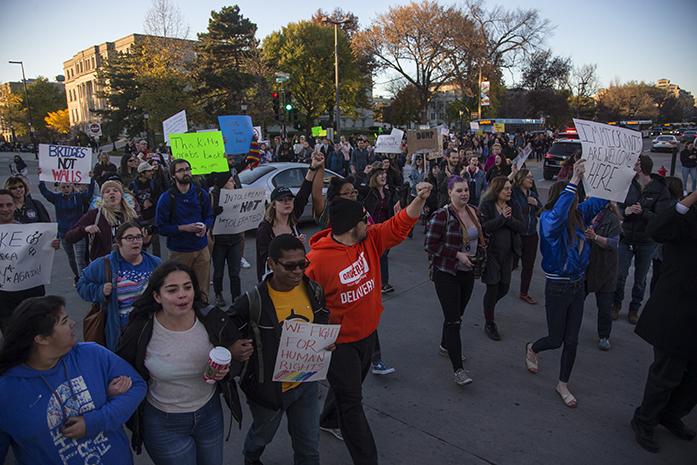By Dot Armstrong
Protests — plural manifestations of dissent — are the new normal. Events of late necessitate, it seems, crowds shouting and waving signs. As Iowa City has discovered, such embodied acts are simultaneously affirming, alarming, and infuriating. I argued last week for increased sensitivity to the numerous meanings expressed through protest, as well as higher artistic standards for demonstrations. Organizing an effective protest is no easy task. But no matter how artless, embodied action is proof that certain constitutional rights continue to function. Certain folks, however, don’t share my view. Numerous states are beginning a legislative battle against inconvenient demonstrations. Protests, fraught yet necessary, are under siege.
Iowa, Minnesota, Nebraska, Michigan, and Washington state have drafted bills aimed at penalizing certain types of protests. Most of these pieces of legislation focus on the hazards posed by protesters; in most bills, demonstrations on highways receive the strictest punishments. For example, Sen. Jake Chapman, R-Adel, created a bill that, according to NPR, would apply to “people blocking highways with speeds posted above 55 mph. Violators could get a felony and spend five years in prison, plus a fine of up to $7,500.” That’s a Class-D felony in Iowa. This putative suggestion seems rather severe, considering the protester in question did not commit any acts of moral depravity or violence.
Speaking of violence, North Dakota is another story entirely. The same NPR broadcast notes a bill from an unnamed lawmaker “that would allow motorists to run over and kill any protester obstructing a highway as long as the driver did not do it intentionally.” Seriously? I hesitate to call such a measure savage, but I’m not sure what other word would do it justice. The hilarious mandate for non-intentional collision doesn’t even redeem the bill for comedic purposes.
I would simply dismiss these bills, blackball the authors, and redouble my efforts to champion embodied action nationwide. But, of course, it’s more complicated than that. These legislative efforts to prevent large, defiant crowds from swarming onto busy roadways is not misguided. Yes, demonstrations present a hazard to motorists; yes, masses and throngs block the thoroughfare for emergency vehicles. I credit the lawmakers for considering the civic adjustments necessary in a new era of normalized demonstrations.
The methods proposed, however, are pretty far off the mark. There’s a vindictive one-upmanship at work here, fueled by an atmosphere of animosity. This is not utilitarian lawmaking. A current of vengeful fervor surges beneath these new bills. As I indicated in my previous article, knee-jerk retaliation is exactly the wrong approach. Moreover, these proposed actions are a dark forecast of further restrictions on free speech. I’ll voice the natural, if paranoid, conclusion: Suppression of highway protests leads to suppression of protests elsewhere.
Protesters are people, with inalienable rights. Their actions and tactics, though ideologically challenging, do not justify lengthy prison sentences and vehicular manslaughter.



